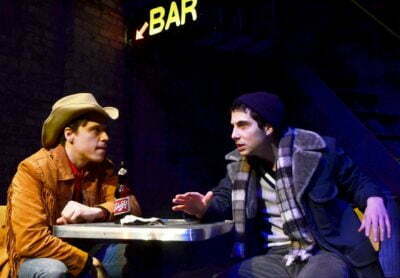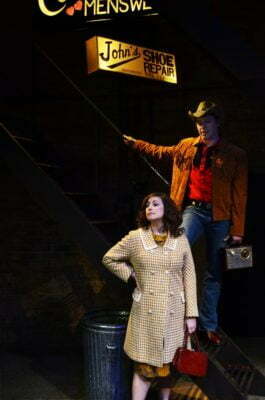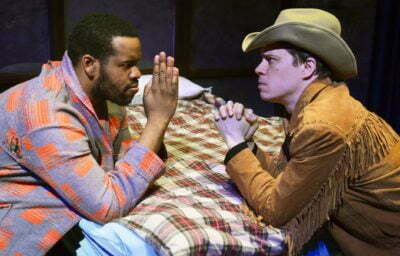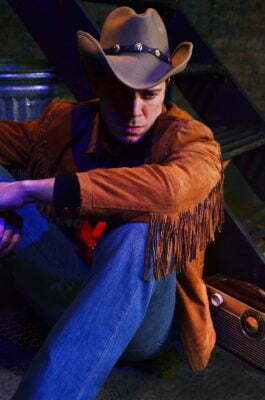Midnight Cowboy
Adapted by Chris Hainsworth
From the Book by James Leo Herlihy
Directed by Christopher M. Walsh
Produced by Lifeline theatre, Chicago
A Confused, Hallucinatory Midnight Cowboy
Midnight Cowboy is one of the most famous and highly-acclaimed classic movies for both its storytelling and for the pushing boundaries of what was considered proper to depict in 1969 (it originally was rated X). However, Lifeline Theatre is mostly in the business of adapting novels for the stage, and James Leo Herlihy’s book is quite different from the film adaptation people are used to. That’s not necessarily a bad thing; theatre is less bound to literal representations and allows characters to be re-interpreted by different actors. But Lifeline may have bit off more than it could chew in this original adaptation. While film uses whiteouts to indicate flashbacks and clearly shows different locations, adaptor Chris Hainsworth’s script is difficult to follow, and the audience’s prior knowledge of the movie is unlikely to be of much help.

What is the same is that Joe Buck (Zach Livingston) leaves his native Texas in hope of becoming a high-end prostitute in New York City for an exclusively female clientele. He’s definitely got the face, physique, and charm, but he’s dumb as a brick and easy to manipulate. Though he manages to get laid within minutes of arriving, he winds up giving money to his customer, and soon realizes he has no idea what he’s doing. He appears to catch a lucky break when the chronically coughing cripple Enrico Salvatore “Ratso” Rizzo (Adam Marcantoni) directs him to a pimp he calls O’Daniel (Gregory Madden), but the man turns out to be a crackpot preacher, and Ratso makes off with Joe’s money. When Joe encounters Ratso again later, both their fortunes have declined even further, and they form an odd friendship/chaste romance, with Ratso as Joe’s new, but equally inept manager.

But it takes nearly until Act II for the play to get to this familiar ground. Most of Act I centers on Joe’s relationship with Perry (Jack Miggins), a gay prostitute who specialized in sadism, and who attempted to teach Joe to exploit the fantasies the johns (or janes) aren’t comfortable acknowledging. Usually Lifeline’s set designs are flexible enough to make changes in location clear, and Joe Schermoly’s has plenty of sliding panels and transformable furniture, but director Christopher M. Walsh couldn’t find a way to communicate where or when these scenes fit into the story. I later learned that they occurred while Joe was still in Texas, but they are interspersed with O’Daniel’s preaching and earlier flashbacks, and are structured in a way that makes Perry appear to comment on Joe’s transition to servicing gay men and tutelage under Rizzo, which happens in New York. Furthermore, while Miggins fully transforms himself vocally and in his mannerisms to deliver Perry’s snide coldness, the fight choreography between him and Livingston isn’t quite believable, which undermines what is supposed to be a significant moment on Joe’s backstory.

Besides that Hainsworth and Walsh attempt to borrow from the book while maintaining the movie’s heavy use of flashbacks and audio association, they also let characters prattle on for too long. Most of the creeps Joe meets are also bores, and while his reaction to the closeted elderly businessman Towny (Patrick Blashill) is more sympathetic than in other versions due to the man’s sheer obnoxiousness, O’Daniel’s preaching was not something we needed fourth and fifth helpings of. Megan DeLay, as one of the few women of means interested in Joe, calls him a symbol to his face, and composes her own literary critique of her interactions with him in real time. Oddly, it’s a bit of a relief when Joe is allowed to talk for extended periods, because he’s one of the few people who’s not too egotistical for his reflections to have value.

Despite this adaptation’s flaws, there are good things about it. Livingston and Marcantoni are quite appealing actors, and having Joe Buck before you in the flesh does produce a much more visceral effect than seeing him in a movie. He’s more vulnerable like this. Sarah Espinoza’s sound design gives Blashill pleasant and poignant country songs to play on his guitar, much like the movie’s soundtrack. The final scene is moving, and Rizzo’s gruff mother-hen attitude stands out from the cruelty and indifference of the other characters. People who have read the book will probably also have a much easier time following the action and understanding what is intended with each character. But on its own, this adaptation is wobbly, and the choices in production don’t help illuminate the script.
Somewhat Recommended
Jacob Davis
[email protected]
Reviewed February 29, 2016
This show has been Jeff recommended.
For more information, see Midnight Cowboy’s page on Theatre in Chicago.
Playing at Lifeline Theatre, 6912 N Glenwood Ave, Chicago. Tickets are $40, with discount for active and retired military personnel, seniors, students, and groups. To order, call 773-761-4477 or visit lifelinetheatre.com. Performances are Thursdays and Fridays at 7:30 pm, Saturdays at 4:00 pm and 8:00 pm, and Sundays at 4:00 pm through April 10. Running time is two hours with one intermission.

